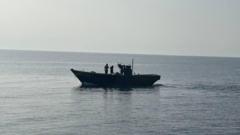Article Text:
South Korea has repatriated six North Koreans who accidentally entered South Korean territory earlier this year, as per reports from the South Korean Ministry of Unification. The officials stated that all individuals had shown a persistent desire to return to their home country.
The two North Koreans who wandered into southern waters in March remained in South Korea for four months, marking the longest period recorded for non-defectors. The other four, identified as sailors, crossed a disputed maritime border in May. This marks the first time such a repatriation has occurred under the presidency of Lee Jae-myung, who previously advocated for better inter-Korean relations. However, the two countries took several months to coordinate the return.
Historically, there have been instances of North Koreans arriving unintentionally in the South, often due to navigation issues with small, wooden boats. In the past, both governments worked together to ensure a safe return through land borders for those wishing to go back to the North. However, since April 2023, North Korea has severed all inter-Korea communication lines amid rising tensions. Kim Jong Un has since declared that unification efforts with the South are no longer feasible.
Seoul attempted to notify the North of the repatriation plan via the United Nations Command but reported that it did not receive any response. Observers noted the presence of North Korean vessels at the handover location, suggesting possible covert agreements between the two nations.
Experts believe that upon their return, these individuals may undergo intensive interrogation regarding any sensitive information regarding the South. Analysts suggest that these individuals might be coerced into furthering state propaganda upon their return, thereby reinforcing Kim's regime's legitimacy.
Michael Madden, a North Korea specialist, noted that the South was in political flux during the time the North Koreans drifted south. Current efforts at reconciliation from President Lee's administration are being met with skepticism, particularly due to North Korea's increasing collaboration with Russia, reducing their impetus to engage with the South.
Reactions from North Korean defectors regarding the repatriation are mixed, with activist Lee Min-bok expressing disappointment that the six North Koreans were not allowed to engage with defectors to learn about South Korean society. Lee fears these individuals might face repercussions back home for having lived in the South.
Despite President Lee's commitments to reopening dialogue with Pyongyang and repairing strained relations, many analysts predict limited progress, with public sentiment in South Korea showing little inclination for further engagement.
South Korea has repatriated six North Koreans who accidentally entered South Korean territory earlier this year, as per reports from the South Korean Ministry of Unification. The officials stated that all individuals had shown a persistent desire to return to their home country.
The two North Koreans who wandered into southern waters in March remained in South Korea for four months, marking the longest period recorded for non-defectors. The other four, identified as sailors, crossed a disputed maritime border in May. This marks the first time such a repatriation has occurred under the presidency of Lee Jae-myung, who previously advocated for better inter-Korean relations. However, the two countries took several months to coordinate the return.
Historically, there have been instances of North Koreans arriving unintentionally in the South, often due to navigation issues with small, wooden boats. In the past, both governments worked together to ensure a safe return through land borders for those wishing to go back to the North. However, since April 2023, North Korea has severed all inter-Korea communication lines amid rising tensions. Kim Jong Un has since declared that unification efforts with the South are no longer feasible.
Seoul attempted to notify the North of the repatriation plan via the United Nations Command but reported that it did not receive any response. Observers noted the presence of North Korean vessels at the handover location, suggesting possible covert agreements between the two nations.
Experts believe that upon their return, these individuals may undergo intensive interrogation regarding any sensitive information regarding the South. Analysts suggest that these individuals might be coerced into furthering state propaganda upon their return, thereby reinforcing Kim's regime's legitimacy.
Michael Madden, a North Korea specialist, noted that the South was in political flux during the time the North Koreans drifted south. Current efforts at reconciliation from President Lee's administration are being met with skepticism, particularly due to North Korea's increasing collaboration with Russia, reducing their impetus to engage with the South.
Reactions from North Korean defectors regarding the repatriation are mixed, with activist Lee Min-bok expressing disappointment that the six North Koreans were not allowed to engage with defectors to learn about South Korean society. Lee fears these individuals might face repercussions back home for having lived in the South.
Despite President Lee's commitments to reopening dialogue with Pyongyang and repairing strained relations, many analysts predict limited progress, with public sentiment in South Korea showing little inclination for further engagement.
















